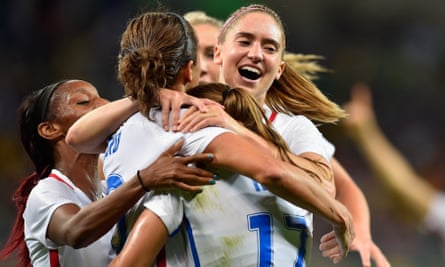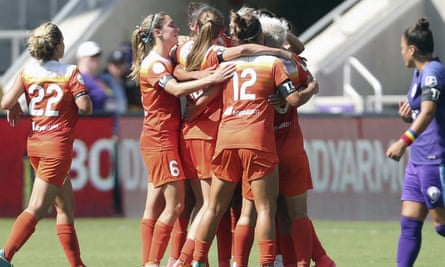Equal pay for equal work. It sounds simple enough. Yet it was enshrined in law only in 2010. However, pay parity wasn’t achieved when pen hit paper on the Equality Act. Just as it wasn’t when the women machinist strike at Ford Dagenham in 1968 forced the Equal Pay Act. Though the gender pay gap has been shrinking, in 2017 it stands at 9.4% in Britain.
What has sport got to do with it? So stark is the pay disparity between sportsmen and sportswomen that it has become a hotbed of action. Wave after wave of teams and players have stepped up in an attempt to pull their sport into the 21st century and give girls the chance of a more sustainable career in sport in the future. There are examples across multiple sports but women’s football has been increasingly at the forefront of the fight for change.
The reason could well be the obscene amount of money that sloshes around the world’s richest sport. Not just in player wages and transfer fees but in sponsorship deals, TV rights, executive salaries and more. Yet this money is concentrated in the men’s game. Women’s football is handed a few crumbs off the table and at the top we have association after association actively resisting the demands of women footballers. Not even demands for parity in many cases, but a greater degree of equality.
Scotland women are the latest team to take a stand, reaching an agreement with the Scottish Football Association on Saturday after implementing a media blackout having raised questions about finances, support and respect.
They used their strong hand heading into the European Championship, to step up their complaint in the face of a seemingly intransigent SFA. It wasn’t an out-and-out strike, as they carried out all playing duties, with their most recent friendly – a 1-0 defeat by Sweden – taking place two weeks ago. However there was, and is, huge significance to their action. These players were under no illusions about what the tournament in the Netherlands, which starts in July, can do to the women’s game in Scotland. It has the potential to have an impact on Scottish women’s football similar to that of the 2012 Olympics and 2015 World Cup in England.
Yet these players, like many before, had been driven to the point where they were willing to jeopardise this. Take that in; the situation was so severe that they were willing to tarnish the buildup to what, for many of them, will be a career highlight and a piece of national sporting history. The team said they hoped to “create a legacy to hand on to the next generation of female players and ensure there is a full and proper commitment by the governing body to promoting the women’s game at grassroots and national level”.
Many of those players are not fully professional. They have jobs outside the game to get by and are the latest in a long chain of women’s sports teams forced by resistant associations into taking action. In 2015 the Australia national team, the most successful Australia football team ever (of either sex), took strike action. Being paid two-thirds less than minimum wage, the former vice-captain Joey Peters cleaned toilets to get by and others joined the dole queues.
Nigeria held a sit-in protest in 2016 over unpaid allowances and bonuses for winning the Women’s Africa Cup of Nations – their eighth African title.
The US women’s national team (USWNT) recently won much improved pay and terms, a long-term fight which came to prominence when five of the country’s top players filed a wage discrimination suit with the Equal Employment Opportunity Commission.

In April the Republic of Ireland squad, forced to get changed in public toilets on the way to matches and sharing tracksuits with youth-team squads, threatened to go on strike before reaching an agreement with the Football Association of Ireland (FAI). They poignantly play Scotland in the latter’s final pre-Euro 17 friendly on 7 July. Significantly, all these protests have been successful. When confronted, outdated practices can be broken.
Some critics argue against equal pay for women footballers on the basis that the men’s game generates significantly more revenue. This may seem a perfectly reasonable argument. Supply and demand; if there are more watching and paying for one than another, the more popular should benefit more. Except it’s not that simple.
If it were, a USWNT that triumphed over Japan in the most-watched football match in US history wouldn’t need to be fighting for equality. They have been proven to be more profitable that the US men’s national team yet are paid 44% less. The US women received a $2m prize for lifting the 2015 World Cup, whereas Germany’s men’s team were handed $35m for their equivalent 2014 triumph. The USMNT were awarded $8m just for reaching the 2014 finals.
This position also assumes a degree of historical parity. Except men’s and women’s football did not start on a level playing field and haven’t had equal opportunities to thrive. Quite the opposite.
Women have had to go to extraordinary lengths to win the right to take part in sport professionally and at amateur level. Sport isn’t removed from society. It was historically seen as the preserve of men, a way to keep a male-dominated workforce fit, healthy and having fun. Women’s participation in sport was a novelty at best. And as society has developed so has sport.
Instead of investment in sport being for the benefit of the population, for decades money has been poured into the profitable parts of the game. Funding, sponsorship, TV rights and more haven’t been handed out with the development of a fit, healthy, happy and equal society in mind. They have been dished out to the most popular, which inevitably saw the men’s game benefit at the expense of women’s. Although attitudes towards women’s football are slowly changing, rather than investing in the “poorer relation” to help it catch up, the rich have been further bolstered. Women’s football deserves better, and it’s the ignorance of this context and history when these debates arise that is disappointing.
While the football industry reflects the views of society around it, in the case of equality it is increasingly lagging behind. Perhaps it’s the male-dominated, often outdated, boardrooms that mean associations resist change, but as teams go public with their grievances they now garner mass support. In the face of threats from the FAI that going public would “endanger their careers at club and international level”, that is just what the eventually victorious Republic of Ireland women’s team did. And this is vital in raising awareness of the backwardness that exists at the top of the game and showing the power of fighting back is important.
There is a long way to go before women’s football is close to being on the coat-tails of the men’s game, let alone equal.
It needs clubs and the governing bodies to be forced to look beyond short-term profitability (because let’s be clear, there is money to make in women’s football, not that it should matter) and champion and fund the game as they do the men’s. In fact forget doing that equally. The men’s game is doing pretty well and there is an argument for addressing the decades of imbalance by tipping the scales the other way.
This isn’t just a debate about groups of players wanting more. It’s about how we can actively reverse the decades of inequality in sport. And to do that will require an overhaul of attitudes and financial and political priorities.
Talking points
The goalkeeper Karen Bardsley has signed a new contract with Manchester City. The England international conceded only one goal in the league as City won their first WSL title crown as part of their double-winning 2016 season.
Southampton have announced plans for the creation of a women’s under-21 side for the 2017-18 season. A promising move from the south-coast club, one of only two Premier League sides – the other being Manchester United – not to have senior women’s team. Leeds United, meanwhile, have taken Leeds Ladies back in-house and praised the growth of women’s football, saying they want to be part of it.
In the NWSL, Houston Dash broke their six-game losing streak with a 2-0 win over Orlando Pride, a week after losing 4-2 to the same opponents in game nine. Carli Lloyd scored her first goal since returning from her Manchester City loan with a powerful strike from just outside the box. Lloyd also played a part in the second goal, her long pass catching the Pride defence off-guard and finding the top scorer Poliana, who crossed for Rachel Daly to poke smartly past the goalkeeper Aubrey Bledsoe. Sofia Hueta scored the winner as Chicago Red Stars came from behind to beat Sky Blue FC 2-1 and stay within four points, with a game in hand, of North Carolina Courage at the top of the table.

The USWNT regained top spot in the Fifa world rankings. Germany dropped into second place while Canada leapfrogged England into fourth, behind France.

Comments (…)
Sign in or create your Guardian account to join the discussion